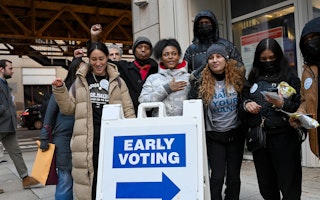What the Pope’s Visit Means for Social Justice
By Jennifer Butler

Pope Francis’s upcoming visit to the United States is drumming up such excitement that the occasion has been alternately dubbed Pope-nado, Pope-mania, and Pope-ageddon. His emphasis on social justice issues like climate change, economic inequality, criminal justice reform, and immigration—as opposed to abortion and gay marriage—has made headlines and excited advocates. And polls indicate the pope’s popularity remains high not just with Catholics but with diverse religious and even secular communities.
But what, if any, impact will his popularity and radical calls to action actually have on American politics and progressive issues?
His visit presents a tremendous opportunity to help foster progressive change. Between September 22 and 27, he’ll make stops in New York City, Philadelphia, and Washington, D.C.; it will also mark the first time a pontiff will have addressed the U.S. Congress. The pope is sure to echo his encyclical on the environment (Laudato Si) released in May, and his critique (Evangelii Gaudium) of a global economic system that allows the powerful to run roughshod over the powerless.
Our survey [PDF], released last week, demonstrated the pope’s potential to help change hearts and minds at a level most contemporary American political figures could only dream of. It showed that he stands to exercise particularly strong influence in three key areas:
- moving the Catholic conversation about politics beyond the traditional “culture wars” skirmishes;
- mobilizing Latino Catholics, especially on issues pertaining to economic inequality; and
- engaging new actors in improving the government’s stewardship of the environment, especially among weekly churchgoers and Republicans.
To give one example of how the pope’s teaching on climate change may be changing hearts and minds, our survey showed that 64 percent of Catholic voters in battleground states had heard about his environmental encyclical. Data showed that Catholic Republicans who read about Laudato Si were more likely to agree that human activities are responsible for climate change (37 percent) than those who received the message from climate scientists (27 percent).
Faith in Public Life has joined with friends and allies to maximize the leverage of the pontiff’s trip. In the run-up to his arrival, we’ve been part of an effort to produce a groundswell of support for his views on economic inequality, immigration, and climate change, among other issues.
We worked with the AFL–CIO, the Service Employees International Union, and community organizing groups to hold scores of events around the country exploring the pope’s statements on inequality. We’ve also called for a nationwide day of prayer during his time stateside, and asked Congress to take up immigration reform anew.
There was a time in this country when the Catholic Church put its muscle behind issues like justice for immigrants, labor rights, and poverty. We’re hoping the calls the pope has already made for greater compassion in dealing with migrants in Europe, and the visits he makes to immigration ministries here, will help renew the church’s focus on this vital humanitarian challenge.
Not everyone will respond favorably to his message. Ironically, some on the Catholic right have questioned the pope’s stance on climate change, for example, arguing he’s not a scientist (even though he studied chemistry, and worked as a chemist prior to joining the seminary). Others have dismissed the pope, saying he’s from Argentina and doesn’t understand income inequality issues in the United States.
But the heartening results in our survey suggest that he has the ability to overcome such divides. And as an interfaith organization, we have a special appreciation for other survey results showing that he has appeal across denominations, inspiring the world to see that climate change, migration, and economic inequality are pressing moral issues.
We look forward to this visit—and to the organizing opportunities ahead, after he’s returned to Rome. The simple truth is we’ve seldom seen a spokesperson with such credibility on these crucial issues, and the potential to help people find moral common ground.
Faith in Public Life is a grantee of the Open Society Foundations.
Jennifer Butler is the founding CEO of Faith in Public Life.


